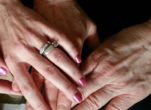
I’m No Longer Calling Him the Messiah
There’s a line I use when I describe a particularly scarring moment in my adolescence: “The Messiah said I was bad.” In many ways, this accurately captures what happened. And it’s something I’ve recently learned to stop saying.
I was raised in the Unification Church—the Moonies. When asked to describe my childhood, I often offer people this: “The best seats I ever had at Madison Square Garden were at my mother’s wedding,” and see if they can figure the rest out. My mother, who was married in the Church’s mass wedding at Madison Square Garden in 1981, joined the Church when I was ten, bringing my older brother and me along with her. The Church became my life and my reason for being. Although I never lived in a Church center, it was the only place I ever wanted to be. I was devoted, and I was also best friends with Rev. Sun Myung Moon’s children.
Until I was banished.
When I was about 16 years old, a dear friend of mine who was born and raised in the Church was caught in a desperate situation. In order to protect herself—to get attention off of her and what was going on in her life—she started rumors about me. She accused me of sinning in ways that not only had I not done, but in my innocence, I couldn’t even have comprehended. She told everyone that I had crushes on the older Church members, that I wanted to sleep with many of the brothers. (This was huge—and hugely bad—in the puritanical constraints of the Church.)
The lies reached Rev. Moon, who was, at that point, my Messiah. My True Father. He heard, and believed, what people were saying about me and therefore decreed that I could no longer play with his daughters. (Well, technically he decreed that only children who were born to Church members whom he had blessed in marriage could play with his children, but that was only to keep me away.) In other words, the Messiah said I was bad.
I didn’t know at the time that these stories had been told about me. I didn’t know that I was accused of being sinful and dirty. I only knew that for some reason, I wasn’t allowed to be with my friends, and that things—and people—around me got weird. But this played perfectly into what I already knew to be true about myself. I already had a sense of being tainted and wrong. I already knew that I was somehow inherently flawed and not good enough. I already knew I wasn’t quite lovable.
As a kid, you misinterpret the nasty things that happen to and around you and somehow believe you’re to blame. I know I did. All the craziness from my childhood—my mom abandoning us to move into the Church; the confusion of growing up in an extremist, controlling situation; my dad, whom we lived with, jokingly offering to sell me to his friends for cocaine; the fear, the uncertainty, the unsafe situations I was put in—all these things, I guess, seared into me the knowledge that there was something awful about me that needed to be hidden.
And then my Messiah—saying it without saying it—agreed.
It took me years, and years of therapy, to realize the immensity of that situation and how deeply it impacted me. The man whom I knew was closest to God, and whom I worshipped beyond belief, ostracized me. I was punished for something I didn’t understand (and didn’t do). No wonder it scarred me. Even though I left the Church somewhere in my early 20s, it still haunted me.
Therefore, over the years, in order to help people understand the effect this had on me, I began to explain, “The Messiah said I was bad.” I hoped this might convey the weightiness, how traumatic it must have been.
Until very recently, when someone who is very dear to me heard me say that (again), paused, and quietly offered, “I think you should stop calling him the Messiah.” Damn was she right.
Each time I called Rev. Moon the Messiah, I was unwittingly reinforcing that old belief in my brain, even though, again, I’d left the Church and its beliefs decades ago. As an executive coach, I tell my clients that they need to stop saying specific things if they want to release themselves from the patterns those specific things reinforce.
My client who calls all the younger workers in his office kids? I told him to stop, or he would never see them differently. My clients who tell me they can’t do something? I tell them to stop, or they’ll be right and they won’t be able to do it.
But for myself, it somehow didn’t dawn on me that I also had to stop. That as traumatizing as it may have been when the man I used to consider my Messiah cast me away, I needed to acknowledge—in my words, as well as my beliefs and actions—that I no longer consider him my Messiah. Or anyone’s Messiah, at that.
Our words are powerful. What we say, we believe. And we create. And we put out to others. We need to choose what we say. To be intentional. We need to tell our truth. To tell the truth we want to tell and to create the world we want to create.
That is why I’m here, sharing this with you. That is why I wrote my memoir, To the Moon and Back, and I’m doing all I can to promote the hell out of it. I am using my words to tell a new story and to create a new world.
And I’m no longer calling him the Messiah.











0 comments to "I’m No Longer Calling Him the Messiah"